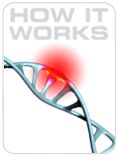人大脑(GBM / CNS)癌症qBiomarker体细胞突变PCR芯片 BrainCancer qBiomarker Mutation PCR Array

人大脑(GBM / CNS)癌症qBiomarker体细胞突变PCR芯片 BrainCancer qBiomarker Mutation PCR Array
人大脑(GBM / CNS)癌症qBiomarker体细胞突变PCR芯片 Brain Cancer qBiomarker Mutation PCR Array
运费 ¥0.00
“英拜为您实验加速”Brain Cancer qBiomarker Mutation PCR Array |
| Product | Species | Technology | Cat. No. |
| Brain Cancer qBiomarker Mutation PCR Array | Human | Somatic Mutation | SMH-025A |
人大脑(GBM / CNS)癌症qBiomarker体细胞突变PCR芯片是一个翻译研究工具,用于快速,准确,全面剖析人类GBM /前体细胞突变的中枢神经系统癌症的基因:BRAF,CTNNB1 /β-连环蛋白,EGFR, IDH1, IDH2, KRAS, NF2, NRAS, PIK3CA, and PTEN。这些突变保证广泛的研究,以提高致癌作用的理解和鉴定潜在的药物靶点。已有许多研究通过单个和多个体细胞突变状态信息鉴定关键信号转导中断。例如,EGFR和KRAS基因的突变状态可以预测某些药物针对这些分子的生理反应。人类GBM/CNS癌症qBiomarker体细胞突变PCR芯片以其全面的内容覆盖范围,用于研究GBM/CNS癌症的环境突变且有潜力用于发现靶向药物的生物标记和验证这些癌症和其他这些突变已确定的癌症。这个芯片包含37个DNA突变序列用于检测最频繁的,功能性验证,在人类GBM/CNS癌症显著突变。这些突变的选择根据全面的体细胞突变数据库和同行评审的科学文献,来自7800多个CNS癌症样本(包括6850份神经胶质瘤样本)发生最频繁重复编译的体细胞突变。每个96孔芯片可以分析2个样品的突变状态,每个384孔芯片可以对 8个样本进行突变分析。简单的产品模式和操作程序让任何一个具备实时定量PCR仪的实验室都可进行常规的体细胞突变分析。BRAF: 1 Assay
The most important BRAF mutation in brain cancer leads to increased kinase activity, the p. V600E mutation.
CTNNB1: 5 Assays
The most frequently detected CTNNB1/beta-catenin mutations result in abnormal signaling in the WNT signaling pathway. The mutated codons are mainly several serine/threonine residues targeted for phosphorylation by GSK-3beta.
EGFR: 4 Assays
The most frequently identified EGFR mutations include P-loop and activation loop point mutations, kinase domain deletions, and insertion mutations.
IDH1: 5 Assays
Most of these mutations abolish magnesium binding and alters the enzyme's activity to convert alpha-ketoglutarate into R(-)-2-hydroxyglutarate instead of isocitrate into alpha-ketoglutarate.
IDH2: 3 Assays
These mutations all lie in the substrate binding domain, and one (p.R140Q) is associated with D-2-hydroxyglutaric aciduria.
KRAS: 2 Assays
The mutation assays include the most frequently occurring mutations in KRAS codons 12, 13, and 61. Mutations at these positions result in reduced intrinsic GTPase activity and/or cause KRAS to become unresponsive to RasGAP.
NF2: 1 Assay
NF2 is similar to some members of the ERM (ezrin, radixin, moesin) family of proteins and links cell-surface proteins with cytoskeletal components and proteins involved in cytoskeletal dynamics. Mutations in this gene are associated with neurofibromatosis type II which is characterized by nervous system and skin tumors and ocular abnormalities.
NRAS: 1 Assay
The most important NRAS mutation in brain cancer occurs at codon 61.
PIK3CA: 3 Assays
The most frequently occurring PIK3CA mutations mainly belong to two classes: gain-of-function kinase domain activating mutations and helical domain mutations that mimic activation by growth factors.
PTEN: 12 Assays
The most commonly detected PTEN loss-of-function mutations are due to either truncation (p.R233* and p.R130*) or point mutations causing phosphatase inactivation (p.R130 and p.R173 mutations).
View a table of the mutations, associated COSMIC IDs and assay numbers, by clicking “Mutation Table” above on the right.
工作原理:
Overview of the qBiomarker Somatic Mutation PCR Array / Assay Protocol

Overview of the qBiomarker Somatic Mutation PCR Array / Assay Protocol.
The procedure involves DNA extraction (QIAGEN QIAamp DNA Mini Kit or FFPE Tissue Kit is recommended), an optional amplification (QIAGEN REPLI-g kit or REPLI-g UltraFast kit is recommended) step for DNA isolated from fresh samples, qPCR detection on qBiomarker Somatic Mutation PCR Arrays or Assays, and data analysis (using the qBiomarker Somatic Mutation Data Analysis Template). An optional DNA sample QC step immediately before the detection array or assay setup allows the user to qualify the DNA samples.
Principle of Mutant Discrimination with ARMS®









